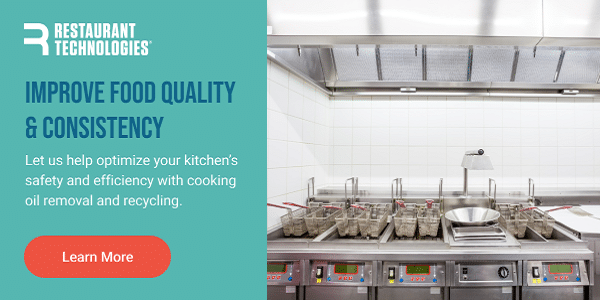
Updated Feb 19, 2024
Effective cooking oil management means doing the necessary tasks to ensure you get the most cooking life out of your fryer oil. Essentially, you want a vat of oil to stay clean and fresh and produce excellent food for as long as possible. This reduces waste, improves profit margins, and increases customer satisfaction. In order to get the most life out of your cooking oil, you need to have an idea of how oil breaks down chemically while it’s in the fryer. In this article, Restaurant Technologies will walk you through how to slow down these chemical processes, extending the life of your cooking oil.
What Causes Cooking Oil to Break Down?
Several things can accelerate the breakdown of oil in a deep fryer — reducing its quality and shortening its cooking life. Educating your staff on these six “enemies of cooking oil” can go a long way toward cooking consistently delicious fried foods.
- Heat: As you cook with oil, continued exposure to heat will cause it to break down. It might make sense for you to turn off your fryers when you’re not using them.
- Water: Not only does water cause oil to smoke and splatter, the hydrogen contained in water also initiates hydrolysis, the first major chemical reaction that oil undergoes as it cooks food.
- Oxygen: Oxygen accelerates oxidation, one of the chemical reactions that degrades the quality of cooking oil and negatively impacts flavor. With oxygen in the air, and in the food you’re cooking, there’s no way to prevent exposing oil to oxygen, but you can try to limit excessive exposure. Splashing food into oil injects oxygen, so avoid dropping food in and instead set it in gently.
- Carbon buildup: Bits of food, breading, or batter break off during the deep frying process. Remove these as soon as possible through skimming or filtering. The longer they remain in the oil, the more they will accelerate breakdown.
- Salt and seasonings: Salt and other seasonings accelerate oil breakdown by increasing the oxidation of fatty acids.
- Soap: Emulsifiers like soap bring oil and water together and catalyze the breakdown of oil through hydrolysis. Soap also gives oil a bitter alkaline taste.
Heat Control: The Key to Making Cooking Oil Last
Looking for a frying oil life extender? Maintaining proper heat determines the lifespan of your cooking oil. Heat is one of the primary culprits responsible for breaking down oil and reducing its quality. To maximize the longevity of your fryer oil, implement the following heat control measures:
- Turn Off Fryers When Not in Use: Continual exposure to heat accelerates oil breakdown. It’s advisable to turn off your fryers when they are not actively in use. This not only conserves energy but also helps maintain the quality of the oil.
- Avoid Excessive Heat Fluctuations: Rapid changes in temperature can also negatively impact cooking oil. Try to keep the fryer temperature consistent during cooking to minimize the stress on the oil.
- Proper Temperature Calibration: Regularly check and calibrate your fryer’s temperature settings. Use a food thermometer to compare the oil temperature to the fryer’s reading. Accurate temperature control ensures that your oil doesn’t get hotter than necessary, which can lead to quicker degradation.
Save on Your Insurance Premiums.
Get end-to-end cooking oil management & clean hood solutions to help you create a safer, more successful business.
Deep Fryer Oil Best Practices to Extend Cooking Life
Are you familiar with these fryer oil best practices? Here are six things every kitchen with a deep fryer should be doing:
- Filter oil at least twice a day: Proper filtration is the most important step in extending the life of your fryer oil. It helps control consistency and keeps operational costs down.
- Skim every 15 minutes: Start by skimming the top and sides of the fryer with a skimmer, and dispose of any particles. Removing loose food particles helps keep your oil cleaner for longer, improves food quality consistency, and maintains the unique flavor profile of your food.
- Establish a schedule for turning off vats: Shutting off the fryer when it’s not in use is an efficient and sustainable way to extend the life of your oil. This also helps conserve energy.
- Cover fryers when not in use: Covering your fryer decreases the likelihood of contamination from substances and particles not intended for the fryer.
- Check fryer calibration on a quarterly basis: Fryer systems tend to require recalibration over time. Compare the temperature of your fryer to the temperature reading on a food thermometer placed in hot oil. Adjust your fryer’s temperature accordingly. If your oil is hotter than you think it is, it will degrade more quickly.
- Fill fryer only to the appropriate oil levels: Avoid filling the fryer above the recommended fill line. Keeping oil measurements at the proper level reduces waste and reduces the likelihood of oil-related injuries.
Cooking Oil Maintenance Tips
On top of crucial restaurant cleaning procedures, follow these additional maintenance guidelines if you’re in search of a fryer oil extender.
- Regular Oil Testing: Regularly test your cooking oil using oil testing kits or devices. These tests can measure the quality and breakdown of the oil, helping you determine when it’s time for a change. Check out our “Put Your Fryer Oil to the Test” how-to guide, which outlines four essential steps to follow for testing oil.
- Proper Storage: Store your unused cooking oil in a cool, dark place away from direct sunlight and heat sources. Exposure to light and heat can accelerate oil degradation.2 Ensure containers are tightly sealed to prevent air and moisture from entering.
- Regular Cleaning and Maintenance of Fryer Equipment: Keep your fryer equipment clean and well-maintained. Regularly clean the fryer’s interior, including heating elements and oil reservoirs, to remove built-up residues that can contribute to oil breakdown. Follow manufacturer instructions for cleaning and maintenance.
- Educate Staff: Safe oil starts with an educated kitchen staff. Train all staff members on proper oil handling and maintenance procedures, from filtration and skimming to temperature control.
How Do You Know If You’re Filtering Your Oil Correctly?
It depends on your deep fryer, but in general, proper oil filtering includes these steps:
- Filter for a minimum of five minutes per fryer vat
- Filter oldest oil first
- Add powder to polish the oil
- Use fryer filter paper
- Clean fryer vat while filtering to remove any food particles
- Check oil with test kit after filtering
- Rotate fryer vats as needed
- Track filtration
- Dispose of oil with manager approval
How Long Should My Oil Last?
All oil has a shelf life. The life of your oil depends on the type of oil used, quality of filtration, the kind of food you’re frying, and how much you use the fryer. Medium-durability oil such as premium soy can generally be used for a few days if properly managed and filtered.
Put Your Fryer Oil to the Test
Regular testing can help determine if your oil is performing optimally. Our “Put Your Fryer Oil to the Test” how-to guide outlines five essential steps to follow for testing oil.
How Does Automated Oil Management Extend Cooking Oil Life?
Oil management tasks are some of the least desirable in a kitchen because they can be messy, hazardous, and labor-intensive. As a result, they often don’t get performed as often as they should. Restaurant Technologies created Total Oil Management — an automated, end-to-end oil management system that works with your existing deep fryer — to make these tasks quick, safe, and easy. With easy filtration and disposal, these formerly difficult jobs now take just a few minutes, and no longer require handling hot oil. That means they get performed more often, which goes a long way toward extending the life of your cooking oil.
Total Oil Management also allows you to remotely monitor filtration activities.. Easily login to your online dashboard and find out when the last time your fryer was filtered, for how long, check filtration trends, and you can even get email alerts if filtration activities deviate from the planned schedule. This way you can always be sure you’re filtering and replacing oil at the right time.
Efficient Oil Use Made Easy
Now that you know how to make fryer oil last longer, it’s important to understand oil quality’s impact on your restaurant. Fryer oil can make or break your customers’ dining experience. Bottom line: your restaurant’s fried food’s taste, texture, and appearance depend on the quality of your oil. While maintaining fryer oil can seem like a sizable investment both in time and resources, it’s worth every penny. To learn more about how we can help you get the most out of your cooking oil, contact a Restaurant Technologies oil expert today.
Sources:
- Rancidity: Causes, Prevention & Effects. (n.d.). Vaia. Retrieved January 26, 2024, from https://www.hellovaia.com/explanations/chemistry/organic-chemistry/rancidity/
- Danielle Haas Freeman, Collin P. Ward, Sunlight-driven dissolution is a major fate of oil at sea.Sci. Adv.8,eabl7605(2022).DOI:10.1126/sciadv.abl7605
